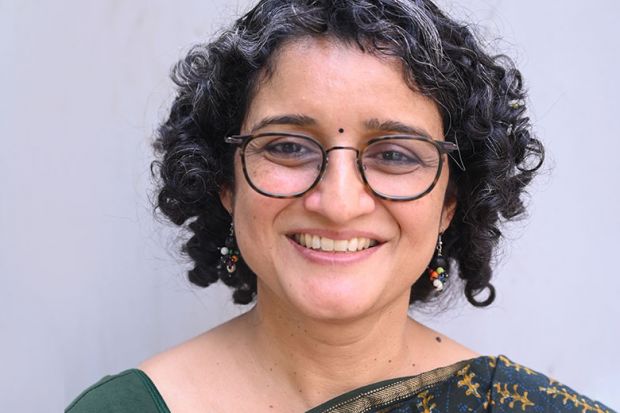“Today is a good day,” said Preeti Aghalayam, director of a new Indian branch campus taking shape off the east coast of Africa. “Today I had my residence and work permit stamped.”
This came just in time. Starting next month, the first students to enrol at the Indian Institute of Technology Madras in Zanzibar (IIT-M Zanzibar) will cross its threshold.
The launch of the overseas branch is a historic moment for Professor Aghalayam, the first female director of an IIT, as well as the institution and the IITs more broadly – marking the first time they have ventured outside India.
The Zanzibar campus, though, is no replica of its 60-year-old parent institution in Chennai, she was quick to say. Most significantly, its offerings are different, with bachelor’s and master’s programmes in data science and artificial intelligence.
“There’s no point in copy-pasting things,” said Professor Aghalayam, who comes to Zanzibar having spent 13 years at IIT-M, most recently as a professor in its department of chemical engineering, having also worked on gender inclusion and global engagement.
In Zanzibar, Professor Aghalayam is responsible for steering IIT-M’s admissions process and criteria, which are run autonomously. While some have speculated that it could become a “back door” into the prestigious IITs, Professor Aghalayam refuted the claim.
“People have also complimented us on the opportunity to do things differently and potentially better than we’re able to do in the Chennai campus,” she said.
For instance, the parent institution has 400,000 applicants – necessitating the use of a computer-graded, entrance exam, which is used by all IITs. Zanzibar doesn’t face this deluge of demand, something its director sees as a silver lining.
“We have the opportunity to talk to these people. Every person who gets an offer letter is someone we’ve had the opportunity to engage with.”
From a signed agreement by Tanzanian and Indian governments and IIT-M this June, the Zanzibar branch has nearly crossed the finish line to becoming a true institution, its director noted. Already, a sizeable number of the 80-odd candidates to receive offer letters have accepted places in this autumn’s inaugural class.
“Right now, we’re in the throes of student recruitment,” she said.
Just about everything at the institution has come together at a breakneck speed, from its director’s 12th-hour work permit to the construction crews still modifying the facilities. Faculty recruitment for Zanzibar’s first year – with a mix of seasoned IIT-M professors and some new early career recruits – was recently completed.
“The biggest thing we had to come to terms with first is the rate at which we wanted to get this going,” she said. “On paper, it’s one thing to say you must strike while the iron is hot, but it’s another thing to operationalise it. We’re building an institution from a grain of sand, pretty much.”
The pace of change is especially impressive given that IITs are public universities, she noted.
“The ball game is extremely different for a private institution…big governments move quite slowly.”
Professor Aghalayam credited education ministries on both sides, as well as Zanzibar’s government, which is funding the institution and has, she said, been welcoming “right from the get-go”.
“I never expected I’d say this as a lifetime academic, but it’s been such a good partnership. We’re learning from each other, we understand each other,” she said. “If we plonk ourselves here as an outsider, I’m not sure it will work. But if we’re part of the education growth story of the region…it’ll be extremely meaningful.”
Still, there’s no denying that the partnership is a big boon for India, a foothold in Africa for the country, which has a strong track record in science and engineering education and ambitions to broaden its reach in the Global South.
Already, student queries seem to indicate that cross-cultural mingling isn’t far off. It’s still a month before classes begin, but accepted students are already starting to ask questions about employment after graduation.
“Immediately these were questions that our Indian students asked: ‘Can I work in Tanzania if I finish an edtech degree at your university?’”
Some 50 per cent of Zanzibar’s first batch of students, based on offers accepted so far, are Indian – the other half coming from east Africa, including Tanzania as well as neighbouring Kenya and Uganda. But this isn’t by design, Professor Aghalayam insisted, noting that “there’s no quotas”.
Still, she admitted that, for recruitment, her institution has a broader reach in India, where the IIT brand is strong, something that’s not as true in Africa, where “we’re not so well known”. Gaining recognition among students and faculty there will take time, she recognised.
For now, though, Professor Aghalayam’s biggest challenge is ensuring a soft landing for the scholars arriving next month.
“My focus in the next few months is toward the people, the dozen faculty from India that are going to come here. I want to ensure they’re comfortable personally and also professionally challenged, and feeling like this is a worthy move for them,” she said.
“Intellectual and professional satisfaction is key. I hope there’s no compromise on that.”
Register to continue
Why register?
- Registration is free and only takes a moment
- Once registered, you can read 3 articles a month
- Sign up for our newsletter
Subscribe
Or subscribe for unlimited access to:
- Unlimited access to news, views, insights & reviews
- Digital editions
- Digital access to THE’s university and college rankings analysis
Already registered or a current subscriber? Login








